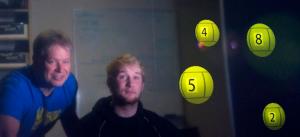
NeuroTracker Awarded $2M Funding for Groundbreaking Concussion Research into Long-Term Brain Health
The Brain Canada Foundation and CQDM have granted $2M for innovative research with NeuroTracker on the long-term effects of concussions on brain health.
MONTREAL, QUEBEC, CANADA, October 31, 2024 /EINPresswire.com/ -- A pioneering research initiative by NeuroTracker, a subsidiary of Nothing Artificial Inc, has received a substantial grant for a $2M brain research project from the Brain Canada Foundation and the Quebec's Consortium for Drug Discovery (CQDM) to undertake an ambitious study on the enduring impacts of concussions on brain health and cognitive function.This research project, which will be conducted in Canada, brings together leading experts in concussion, vision, and neuroimaging to comprehensively examine the long-term consequences of mild brain traumas, with a particular focus on how they affect aging males and females differently. The research also aims to determine if cognitive training can facilitate neurological recovery in individuals with a history of concussions.
Over two billion people are estimated to have experienced a concussion at some point in their lives. Recent evidence has demonstrated that concussions can lead to chronic neurological disturbances that persist for more than 20 years, affecting brain structure and doubling the risk of developing dementia in later life. Despite the prevalence of concussions, their diagnoses remain notoriously challenging, and gender-based differences in their effects are not well understood. Furthermore, there is a scarcity of effective therapies to manage and treat the enduring consequences of concussions.
About the Study
The research, which is a joint collaboration between The Faubert Lab at the University of Montreal, the University of Victoria, and NeuroTracker, a subsidiary of Nothing Artificial Inc, a Montreal-based tech transfer company, and will engage cutting-edge techniques in brain health assessment. A cohort of 200 older subjects with and without a history of concussions will undergo cognitive assessments, utilizing state-of-the-art methods such as blood-based biomarker analysis, fMRI diffusion tensor imaging, and cognitive assessment through NeuroTracker (3D MOT) digital therapeutic technology—a scientifically validated tool for measuring integrated brain functions. This comprehensive approach will allow researchers to assess whether practical cognitive evaluations can serve as functional biomarkers of brain health, potentially offering a cost-effective and remote alternative to traditional diagnostic methods.
The study will also incorporate a six-month NeuroTracker training intervention for half of the participants with a history of concussions. After this training, the same combination of cognitive assessments will be administered to determine whether the adverse effects of past brain trauma can be reversed, both biologically and functionally. The project will be completed over 3 years, but will include the publishing of several papers based on findings and analysis during the research process.
The overarching objective of this research is to achieve an unprecedented level of sensitivity in assessing the long-term effects of concussions on brain health and function, and to investigate whether these effects can be effectively addressed with a highly practical form of treatment.
The collaboration between The Faubert Lab, the University of Victoria, and NeuroTracker brings together distinguished experts in the fields of concussion, vision, and neuroimaging:
Professor Jocelyn Faubert a pre-eminent expert in vision and perceptual-cognitive science with more than 240 multi-disciplinary articles published in peer-reviewed journals.
Dr. Brian Christie an internationally recognized leader in learning and memory research and an active member of 5 brain health and concussion focus research institutes.
Dr. Jodie Gawryluk a clinical neuropsychologist with expertise in both neuroimaging, and strategic lead of Brain Health at the Institute on Aging & Lifelong Health.
This groundbreaking research holds the potential to redefine our understanding of the long-term effects of concussions on brain health and functioning, while exploring the practicality of innovative cognitive training interventions.
For more information about this research project, please contact:
1-855-480-0808 ext. 707
media@neurotrackerx.com
About NeuroTracker
NeuroTracker, a subsidiary of Nothing Artificial Inc, a Montreal-based tech-transfer company, has played a vital role in this research project. Founded in 2009, NeuroTracker licenses and patents neurotechnologies developed out of the Faubert Lab for commercial development. NeuroTracker has been recognized as an industry leader in the digital therapeutics space and actively collaborates with leaders in neuroscience research.
The core technology behind NeuroTracker is a unique digital cognitive assessment and enhancement tool developed from pure neuroscience research at the Faubert Lab. It utilizes 3D Multiple Object Tracking (3DMOT) to stimulate and measure the integration of high-level cognitive functions with over 100 independently published studies demonstrating its efficacy for cognitive assessment and enhancement.
Jonathan Anderson
NeuroTracker
+1 855-480-0808 ext. 707
media@neurotrackerx.com
Visit us on social media:
Facebook
X
LinkedIn
Instagram
YouTube
Distribution channels: Healthcare & Pharmaceuticals Industry
Legal Disclaimer:
EIN Presswire provides this news content "as is" without warranty of any kind. We do not accept any responsibility or liability for the accuracy, content, images, videos, licenses, completeness, legality, or reliability of the information contained in this article. If you have any complaints or copyright issues related to this article, kindly contact the author above.
Submit your press release
